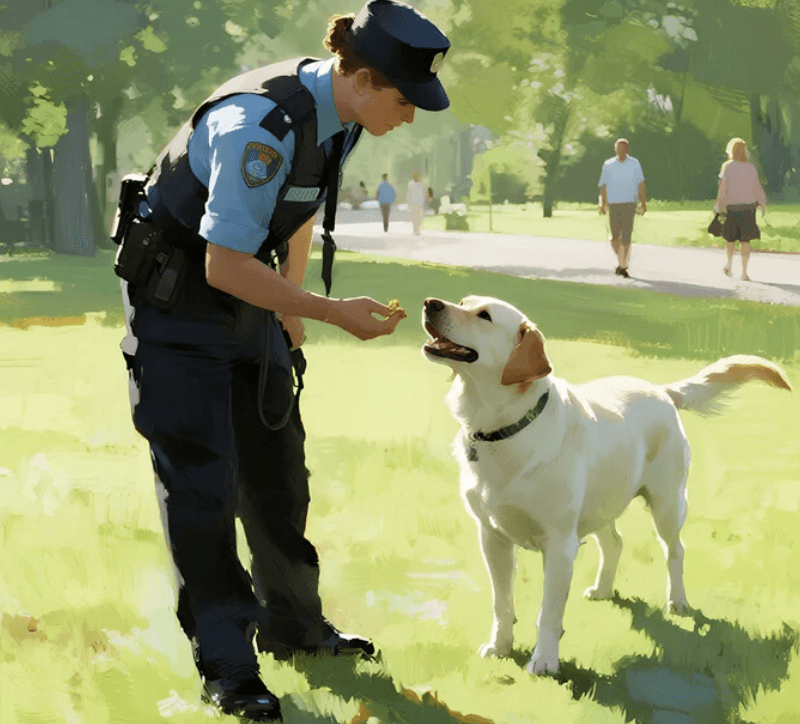Best Dog Trainers for Handicap People – Top Programs and Services in 2025

Why Dog Training Matters for Handicapped Individuals
For individuals living with physical, sensory, or neurological disabilities, service dogs can be life-changing. These specially trained dogs offer physical assistance, emotional support, and enhanced independence.
However, the key to unlocking these benefits lies in finding the best dog trainers for handicap people. This article dives into top programs, what to look for in a trainer, and how dog training empowers people with disabilities in daily life.
What Is a Service Dog for Handicap Individuals?
A service dog is a specially trained canine that helps people with disabilities perform specific tasks. These dogs are more than pets; they are working partners.
Depending on the person's condition, a service dog might assist by opening doors, guiding through crowds, retrieving dropped items, or alerting to medical emergencies such as seizures or blood sugar imbalances.
The effectiveness of a service dog is directly tied to the quality of its training. Therefore, choosing the right trainer or training facility is critical to ensure the dog can meet the specific needs of its owner.
Types of Service Dogs for Handicap People
Dog trainers often specialize in certain types of service dogs based on the kind of assistance the handler requires. Here are the main categories:
- Mobility Assistance Dogs: Help people with limited mobility walk, transfer from wheelchair to bed, or retrieve items.
- Guide Dogs: Assist visually impaired or blind individuals in navigating daily environments safely.
- Hearing Dogs: Alert deaf or hard-of-hearing individuals to sounds like doorbells, fire alarms, or ringing phones.
- Medical Alert Dogs: Detect medical conditions such as seizures, diabetes crashes, or PTSD symptoms.
- Psychiatric Service Dogs: Aid individuals with mental health conditions like anxiety, depression, or autism.
Top Dog Training Programs for Handicapped Individuals in 2025
Below are some of the most trusted dog training programs that cater specifically to people with disabilities.
These organizations offer certified, ADA-compliant service dog training services.
1. Canine Companions for Independence (CCI)
Established in 1975, CCI is a leader in service dog training for people with physical disabilities. They offer fully trained dogs for mobility assistance, hearing support, and PTSD. Training is free of charge, although there is a waitlist. Their dogs undergo 18–24 months of intensive training before placement.
2. NEADS World Class Service Dogs
NEADS provides service dogs for veterans, children with autism, and adults with hearing loss or physical disabilities. They offer customized training based on the handler’s specific needs. Their matching process ensures compatibility between the dog’s temperament and the owner's requirements.
3. Paws With A Cause
This nonprofit organization custom-trains dogs for people with physical disabilities, hearing loss, and seizure disorders. They also work with local trainers to provide at-home sessions. Their trainers are highly specialized in positive reinforcement and disability-focused training.
4. Service Dogs for America
This group trains dogs for mobility, PTSD, and autism-related assistance. They also provide a robust handler training program, helping new owners understand how to communicate with and care for their dog post-placement.
5. The Seeing Eye
For individuals who are blind or visually impaired, The Seeing Eye is a globally respected training school. Their dogs are trained to navigate streets, recognize obstacles, and even remember daily routines like bus stops or work commutes.
How to Choose the Best Dog Trainer for Handicap Needs
Not every dog trainer is equipped to prepare a service dog. When evaluating your options, keep these factors in mind:
1. ADA Compliance
Make sure the trainer understands and complies with the Americans with Disabilities Act (ADA). This ensures your dog will be recognized as a working service dog with full public access rights.
2. Certification and Experience
Look for trainers certified by organizations like the International Association of Assistance Dog Partners (IAADP) or Assistance Dogs International (ADI). Trainers should have a strong track record of working with people with disabilities.
3. Customization of Training
Your condition is unique, and so should be your dog's training. The best programs tailor their approach based on your lifestyle, medical needs, and mobility constraints.
4. Ongoing Support
A good trainer will offer post-placement support, including refreshers, behavior consultations, and emergency training updates.
Online vs In-Person Dog Training: What Works Best?
With the rise of remote education, many training centers now offer hybrid or fully online dog training programs. However, service dog training for handicap individuals often requires in-person instruction, especially for mobility and guide dog tasks. That said, online courses can be helpful for basic obedience, early bonding, or continued education.
Financial Aid and Funding Options
Training a service dog can cost anywhere between $10,000 and $50,000. Thankfully, several programs offer financial assistance, grants, or free services:
- Veteran Affairs (VA): Covers service dog training for eligible veterans.
- Social Security Disability Insurance (SSDI): May include provisions for service animals.
- Nonprofits: Many organizations like CCI or Paws With A Cause provide dogs at no cost to the recipient.
- Community Fundraising: Platforms like GoFundMe or local charities often help individuals raise funds.
Success Stories: Real Impact of Dog Training for the Disabled
Consider Jane, a wheelchair user with a spinal cord injury. After receiving a mobility assistance dog from NEADS, her independence skyrocketed.
Her dog can open doors, pick up dropped items, and even assist during transfers. More than practical help, her dog has become her daily companion and emotional support system.
Or meet Carlos, a combat veteran living with PTSD. His psychiatric service dog, trained through Paws With A Cause, interrupts flashbacks, provides a buffer in crowds, and gives him the confidence to reintegrate into civilian life.
Conclusion: A Life-Changing Decision
Finding the best dog trainers for handicap people is not just about obedience or tricks — it’s about transforming lives. With the right training program and canine partner, individuals with disabilities can enjoy greater autonomy, security, and joy in daily life. Whether you're considering a service dog for yourself or a loved one, the resources and trainers listed above are excellent starting points.
Frequently Asked Questions (FAQs)
How long does it take to train a service dog?
Service dogs typically undergo 18 to 24 months of training. This includes basic obedience, specialized skills, and acclimation to public environments.
Can I train my own dog to be a service dog?
Yes, under U.S. law, individuals are allowed to train their own service dog. However, it’s highly recommended to work with a professional experienced in training dogs for disabilities.
What breeds are best for service dog work?
Popular breeds include Labrador Retrievers, Golden Retrievers, Standard Poodles, and German Shepherds due to their intelligence, temperament, and adaptability.
Do service dogs need to wear a vest?
While not legally required, a service dog vest helps signal to the public that your dog is working and should not be distracted.
Where can I find local service dog trainers?
Start with ADI's directory or consult with local disability support organizations. Many national programs also offer regional support or referrals.
 Related Articles
Related Articles





